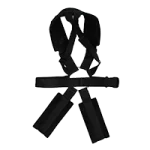It’s hard to imagine anything less sexy than being diagnosed with cancer, especially a recent one. Finding out you have cancer and knowing that the difficult road to treatment and recovery lies ahead can be very challenging and disruptive on many levels: mental, emotional, spiritual, physical, and of course, sexual.
Although the risks of being diagnosed with cancer increase with age, the facts are facts: a person can be diagnosed with cancer at any age, and Cancer rates are actually increasing among young adults and adolescents; overall cancer rates increased in all age groups of young adults between 2007 and 2016. Compared to older age groups with cancer, younger patients tend to have a higher risk of long-term effects such as infertility or sexual dysfunction. In reality, this is simply due to being younger and having more time to live in this world, as well as having the sex hormones of a younger person.

You are not “doomed” to any particular experience
Although there are a wide variety of treatment options and scenarios depending on the specifics of your case, chemotherapy, in some form and for some duration, is one of the most common treatment recommendations.
Know this: Your sex life will not necessarily be affected by your treatments. Nothing is a given. Some people continue their sex lives normally even during treatment, so try not to jump to conclusions about statistics or other people’s experiences. However, it is understandable that this can be difficult given all the information out there. possible sexual side effects of chemotherapy that are easily accessible. The combined anticipation and uncertainty can result in a particularly severe case of anxiety and/or depression, which can, on its own, affect your sex life even before treatment begins.
Gender: after diagnosis, before chemotherapy
While the specifics of your case (i.e., the type and stage of cancer, your overall health, and your relationship to sex) can greatly influence your experience, it’s completely normal for a cancer diagnosis to affect your sexual identity, body image, and self-confidence.
If you’re feeling seriously ill, overwhelmed by thoughts of your own mortality, or just stressed about everything, your sex life may be the last thing on your mind. For those of us who have a strong sexual connection with a partner, dealing with a serious illness is hard enough without having to worry about how losing your libido can affect our relationship. Sometimes, you may feel like you’re carrying the emotional burden of not one, but two people, and you may even imagine that going through cancer would be easier if you were single. Hell, you may even imagine that things would be easier without having to worry about the emotions of your family and friends. While that’s completely understandable, more united people The more you can surround yourself with, the better, even if it makes you feel more vulnerable than you ever wanted.
Communication is king
What is the most powerful antidote humanity knows to uncertainty and anxiety? Strong, consistent communication, of course.

If you are concerned about how chemotherapy might affect your sex life, be sure to discuss this with your doctor or nurse before your treatment. They will be able to explain the general side effects you might (or might not) expect from your treatment, as well as how these side effects might (or might not) affect your sex life. Some types of cancerfor example, expose you more than others to such effects. Whether you are in a relationship or not, if sex is an important part of your life, you need to talk about it so that you can approach it armed with all the information you have. After all, knowing more can even help you take steps to mitigate or even avoid certain side effects. Never hesitate to ask your doctor for advice all questions.
If you are As a couple, it is also important to discuss your feelings and concerns with your partner. While the chances of you having sexual problems are relatively low, your partner may also be worried. It is always best to express your concerns, whether they are mutual or not, as it helps to cultivate a united front, which is always a boon on the road to good health. Many cancer patients have actually reported that their relationship with their partner has has become stronger since their diagnosis, even in cases where sexual dysfunction had to be overcome.
Significant help is available
Unfortunately, some medical providers are unfamiliar with their patients’ sex lives and/or are uncomfortable talking about them. That said, there are doctors, physical therapists, and sexologists who are specialized and more than well-equipped to help you. Additionally, there are professional associations like the International Society for the Study of Women’s Sexual Health and the Sexual Medicine Society of North America which can help connect you to a range of helpful resources.
You can do it. <3


 Anal Beads
Anal Beads Anal Vibrators
Anal Vibrators Butt Plugs
Butt Plugs Prostate Massagers
Prostate Massagers
 Alien Dildos
Alien Dildos Realistic Dildos
Realistic Dildos
 Kegel Exercisers & Balls
Kegel Exercisers & Balls Classic Vibrating Eggs
Classic Vibrating Eggs Remote Vibrating Eggs
Remote Vibrating Eggs Vibrating Bullets
Vibrating Bullets
 Bullet Vibrators
Bullet Vibrators Classic Vibrators
Classic Vibrators Clitoral Vibrators
Clitoral Vibrators G-Spot Vibrators
G-Spot Vibrators Massage Wand Vibrators
Massage Wand Vibrators Rabbit Vibrators
Rabbit Vibrators Remote Vibrators
Remote Vibrators
 Pocket Stroker & Pussy Masturbators
Pocket Stroker & Pussy Masturbators Vibrating Masturbators
Vibrating Masturbators
 Cock Rings
Cock Rings Penis Pumps
Penis Pumps
 Wearable Vibrators
Wearable Vibrators Blindfolds, Masks & Gags
Blindfolds, Masks & Gags Bondage Kits
Bondage Kits Bondage Wear & Fetish Clothing
Bondage Wear & Fetish Clothing Restraints & Handcuffs
Restraints & Handcuffs Sex Swings
Sex Swings Ticklers, Paddles & Whips
Ticklers, Paddles & Whips



















